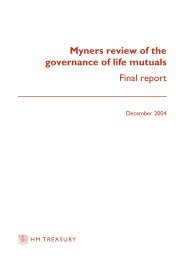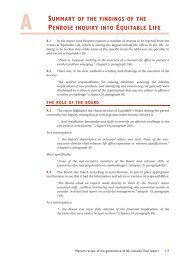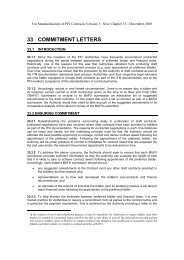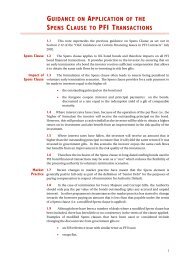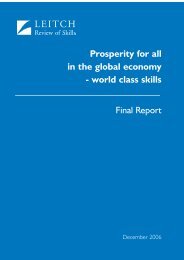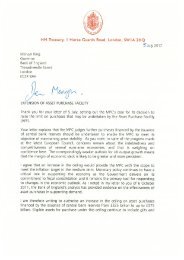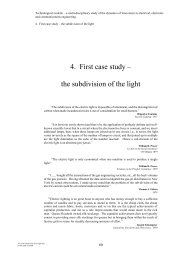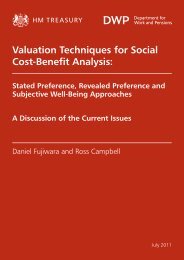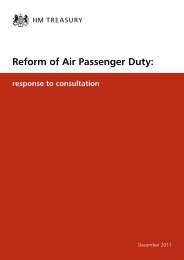Valuing Our Natural Environment Final Report ... - HM Treasury
Valuing Our Natural Environment Final Report ... - HM Treasury
Valuing Our Natural Environment Final Report ... - HM Treasury
You also want an ePaper? Increase the reach of your titles
YUMPU automatically turns print PDFs into web optimized ePapers that Google loves.
<strong>Valuing</strong> <strong>Our</strong> <strong>Natural</strong> <strong>Environment</strong> – <strong>Final</strong> <strong>Report</strong> - Annex1<br />
More generally, questionnaires can provide useful background data for decision-making and<br />
deliberative processes of all sorts. While questionnaires are not really a substitute for<br />
participation they can be a very useful as a complement to participatory results, which<br />
generally suffer from a lack of statistical significance or ‘true representativeness’.<br />
Interviews and questionnaires can also be used to recruit participants for further research.<br />
This can be as simple as adding a question "would you be willing to take part in …?", but<br />
often advantage can be taken of the opportunity to select participants such that a spread<br />
of demographic characteristics, attitudes and behaviours is represented in the focus groups,<br />
jury, etc.<br />
A1.2.2 Focus groups, In-depth groups<br />
A1.2.2.1 Objectives<br />
Focus groups aim to discover the positions of participants regarding, and/or explore how<br />
participants interact when discussing, a pre-defined issue or set of related issues.<br />
In-depth groups are similar in some respects, but may meet on several occasions, and are<br />
much less closely facilitated, with the emphasis being more on how the group creates<br />
discourse on the topic.<br />
A1.2.2.2 Value concept encapsulated<br />
In theory focus groups and in-depth groups can consider any concept of value. Generally,<br />
monetary valuation of an environmental good or service is not the objective of the exercise<br />
(but see below). More likely, the group will focus on how to choose between conflicting<br />
objectives, or on what decision should be made in a particular circumstance, or on the<br />
reasons underlying particular behaviours or responses to policy. The format does not<br />
necessarily encourage "citizen" values, indeed it can concentrate on private motives for<br />
behaviour, but the format also lends itself to consideration of what society should do.<br />
A1.2.2.3 Theoretical basis<br />
Focus groups and in-depth groups are research methods which can be integrated into<br />
deliberative processes. That is, these methods have developed as tools for understanding<br />
how individuals and groups frame and understand different issues and policies. However<br />
this can also be used as a part of a deliberative process in which the participants<br />
themselves might use the focus group to understand their own and others' attitudes prior to<br />
other aspects of group work, such as taking part in a citizens' jury.<br />
Work with small groups can be grounded in a variety of theoretical frameworks. For<br />
example, sociological theories of ‘symbolic interactionism’ draw on the idea of humans as<br />
social beings. The sense of being a unique individual derives from our total immersion in<br />
the relational processes of social interaction which constitute the contexts of everyday life.<br />
Communicative processes (talk, actions, representations, discourses etc) are fundamental<br />
elements of social interaction and provide part of the rules/structures within which<br />
individuals play their parts. There are other possibilities: a social theoretical approach<br />
holds that preferences are personal expressions, whereas values find embodiment in social<br />
actions and the organisations that support them. How nature is valued, therefore, cannot<br />
be separated from the ways in which society is organised and functions. In-depth groups<br />
draw their principles and practices from Group Analytic theory, and aim to give maximum<br />
freedom to participants to define and develop their own discourse.<br />
What small groups do – to a greater or lesser extent – is to provide structured opportunities<br />
for social interaction in which the participants are able to communicate with one another<br />
to explore different elements of whatever is the substance of the enquiry.<br />
A1.2.2.4 Process of implementation<br />
The practical undertaking of a focus group/in-depth group typically entails a number of<br />
stages:<br />
eftec A34<br />
December 2006



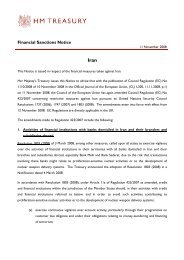
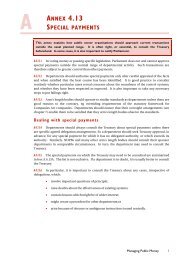
![AIRTO [Professor Dr Brian Blunden] - HM Treasury](https://img.yumpu.com/15492848/1/184x260/airto-professor-dr-brian-blunden-hm-treasury.jpg?quality=85)
